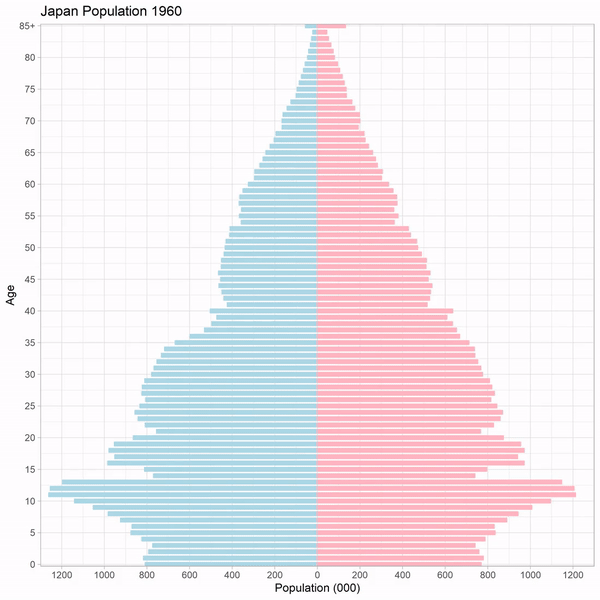
In 1966, Japan experienced a sudden drop in its fertility rate—for just that year. During the 1960s, the fertility rate was about 2.0 to 2.1 children per woman, but in 1966 it dropped dramatically to 1.6 children per woman (Chart 2). The number of births in 1966 was much lower than in surrounding years, as can also be seen in Japan’s population pyramid, where there’s a big dent for people born in 1966 (the highlighted bars). This isn’t an error in the data, it’s real.
Do you know why this happened? It’s a well-known phenomenon for Japanese people, but might not be clear to others. Many Japanese families chose not to have children in 1966 due to their superstition of “Hinoe-Uma (Fire-Horse)”. Fire-Horse is the 43rd combination of the sexagenary cycle, which happens every 60 years. The superstition is that women born in this year of the “Fire-Horse” have a bad personality and will kill their future husband. I presume the parents then were worried about their daughter’s huge disadvantage in the future marriage market, so they chose to avoid the risk of having a girl. Sex detection during pregnancy was not available then, so many families avoided having children altogether in 1966. This kind of superstition seems to have been more prevalent in rural areas than in urban areas, because the fertility drop in urban areas was less than in rural areas.1
This kind of superstition might have a larger impact for arranged marriages, where parents exchange their son’s or daughter’s photo through their network to search for their child’s future spouse. But things have changed a lot in the last several decades in Japan, including the way to find one's future spouse. Before 1945, arranged marriage consisted of 70% of all marriages, but it came down to half in 1960s, less than 30% in 1980s, and only 5% of all marriages were arranged in 2010.2,3
There are very few arranged marriages in Japan these days. I don’t believe that the curse of the Fire-Horse can do much to love marriages, and I believe there will be very few families who care about this superstition in the next Fire-Horse year of 2026.
References
- 伊藤達也・坂東里江子(1987) 「同居児法による「ひのえうま」の出生変動の計測と分析」 『人口問題研究第181号』 厚生省人口問題研究所
- 厚生省人口問題研究所(1978)『 昭和52年度実地調査 第7次出産力調査報告 概報および主要結果表』
- 国立社会保障・人口問題研究所(2011)『 第14回出生動向基本調査 結婚と出産に関する全国調査 夫婦調査の結果概要』



Join the Conversation